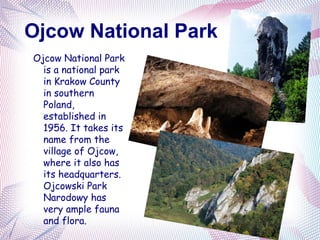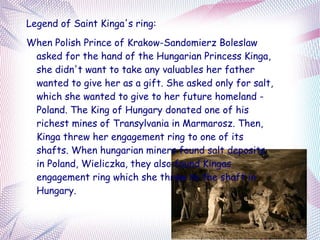Poland presentation
- 1. Our School. Our Country. Our City.
- 2. Hello! We want to show you some interesting information about our town, school and country.
- 3. Our city. Kety is a town in OswiÄcim County. The townâs name comes from the word âkatâ (eng. Corner) . The greatest development of the town came under the rule of Jagiellonians, when the town became royal property. Kety is also a birthplace of Saint John Cantius (Jan Kanty).
- 4. Very popular place in Kety is its "Rynek Street" - a place, where people can hang out with family and friends. We also have got museum, in which you can learn some information about history of our town.
- 5. Poland is beautiful and very interesting
- 6. Tatra Mountains Tatra Mountains - the highest mountain group in the Carpathians, the border between Poland and Slovakia. Tatra mountains are famous for its beautiful lakes like Morskie Oko - Sea Eye, and Wielki Staw. In the Tatras mountains, there are two national parks and many famous tourist centers like Zakopane, Stary Smokowiec and Szczyrskie Jezioro.
- 7. Little Beskids The Little Beskids (Polish: Beskid MaÅy) is one of the Beskids mountain ranges in the Western Beskids ranges of the Outer Western Carpathians in southeastern Poland. Within the range is the protected area known as Little Beskids Landscape Park. It is famous for beautiful views. It attracts many people because of its tourist trails. The highest mountain in Beskid MaÅy is Babia GÃģra.
- 8. Bieszczady Bieszczady is one of the most attractive landscapes in Poland. In Sanok, town in Bieszczady, there is a fourteenth century castle. There are also a few museums which contain pieces of history of inhabitants of this region.
- 9. Baltic Sea Baltic Sea isn't that warm and clean as Mediterranean Sea, but still, you can take a trip to the coast and have a great time. Many tourist attractions await in coastal cities of Poland such as TrÃģjmiasto or Szczecin.
- 10. Vistula Polish Vistula is the longest river, which flows through whole Poland up to Baltic Sea. It flows through Poland's largest cities - Warsaw and KrakÃģw. Its length is 1047km.
- 11. Masurian Lake District Masurian Lake District in northern Poland is a complex of many lakes and beautiful landscapes. Here are located the biggest Polish lakes: Sniardwy and Mamry. Masuria is known as a great place for spending holidays and summer. It attracts many tourists every year.
- 12. Ojcow National Park Ojcow National Park is a national park in Krakow County in southern Poland, established in 1956. It takes its name from the village of Ojcow, where it also has its headquarters. Ojcowski Park Narodowy has very ample fauna and flora.
- 13. Puszcza Bialowieska Puszcza Bialowieska is an ancient woodland that straddles the border between two countries, Belarusand and Poland. The border between the two countries runs through the forest. The forest is home to 800 European bisons, the continent's heaviest land animals.
- 14. Krakow Krakow is the second largest and one of the oldest cities in Poland , Situated on the Vistula River.Krakow has traditionally been one of the leading centres of Polish academic, cultural, and artistic life and is one of Poland's most important economic hubs. On the top of the Wawel hill in Krakow there is a grandiose castle - a residence of Polish kings since the Middle Ages. The Wawel Royal Castle is probably the most prominent tourist attraction not only in Krakow, but in Poland. The legend of the Wawel Dragon makes Krakow even more attractive
- 15. Here is what the legend says: Once upon a time, many centuries ago, in a cave near the Vistula River lived a giant fire-breathing dragon. He was a veritable nuisance to the local inhabitants because he not only loved to devour their cattle but what is worse human virgins. Many knights came in an attempt to slay the beast, however, none was successful since it burnt valiant fighters before they could draw out their swords. The King was desperate, so He promised to reward the dragon slayer with his daughter`s hand and half of the kingdom. Many tried, nobody prevailed, until the one day when a poor shoemaker Skuba appeared before the king and volunteered to kill the horrible creature. Skuba thought of a plan to prepare a special dish for the dragon - a sheep stuffed with tar and sulfur. At dawn Skuba placed prepared sheep at the cave's entrance. The dragon ate the sheep for his breakfast and Soon felt like his stomach was on fire. The fiery feeling was so intense that the dragon stood on the bank of the river and started to drink water. Nothing seemed to help? the dragon kept on drinking more and more. His belly grew bigger and bigger since he kept drinking until he blew up in a powerful explosion. Residents of Krakow rejoiced seeing the happy end of their troubles. The brave and smart shoemaker married the beautiful princess and after King Krak's death became a ruler of Krakow.
- 16. Gniezno Gniezno is a city in central- western Poland, some 50 km east of PoznaÃą, inhabited by about 70,000 people. There are archaeological traces of human settlement since the late Paleolithic. Early Slavonic settlements on the Lech Hill and the Maiden Hill are dated to 8th century
- 17. Legend of Lech, Czech and Rus According to the Polish version of legends: three brothers Lech, Czech and Rus were exploring the wilderness to find a place to settle. Suddenly, they saw a hill with an old oak and an eagle on top. Lech said: this white eagle I will adopt as an emblem of my people, and around this oak I will build my stronghold, and because of the eagle nest [Polish: gniazdo].[1] I will call it Gniezdno [modern: Gniezno]. The other brothers went further on to find a place for their people. Czech went to the South (to found the Czech Lands) and Rus went to the East (to create Rus' (region)).
- 18. Torun Torun is one of the most popular Polish cities. While in Torun, it is necessary to visit the House and the Museum of Copernicus, which are located in two Gothic townhouses on Copernicus Street. These are extremely valuable buildings that have survived since the Middle Ages. The walls, the layout and decoration reflect the history of the city and its inhabitants, and the original interior and accessories allow you to move into the era of Copernicus and learn about the daily life of a rich bourgeois family.
- 19. Zakopane Sometimes referred to as "the capital of winter sports." Appears in the first position on the list of the most popular tourist destinations - mainly in winter. It offers many attractions and is seen as one of the most representative of Polish cities. At the same time, it is very colorful and worth to visit.
- 20. Tri-City Tri-City - a common name for a complex urban area of Gdansk, Gdynia and Sopot. Tri-City is one of the most important centers of industrial, scientific and cultural events in Poland .One of the biggest attractions of Sopot is the longest pier on the Baltic Sea, which is about half kilometer long. In the center of Gdynia is located the Gdynia Aquarium, where you can admire more than 1,600 aquatic animals belonging to 200 species from various parts of the globe. Every year in August, in Gdansk, there is the St. Dominic's Fair, which is the largest event of it's kind in Europe.
- 21. Warsaw Warsaw is the capital of Poland. It's the largest Polish city located in eastern- central part of the country. Here are located such important buildings as Polish Parliament or the Prime Minister's Office. In Warsaw's center you can see the highest building in Poland- the Palace of Culture and Science. From the top floor of the Palace there is an unique and unforgettable view of the whole Warsaw's panorama. The National Stadium and Baths Park are also worth seeing. Many of cultural, scientific, entertainment and sporting events take place there.
- 22. Zamosc Zamosc is a town located in the eastern part of Poland. It is one of the major cultural and educational centres in our country. ZamoÅsc is famous as a "Pearl of Renaissance" because of its unique architecture. It was established in 1580 by hetman Jan Zamoyski and named after him.
- 23. Zelazowa Wola Zelazowa Wola is a village in east- central Poland. The village is the birthplace of pianist and composer Fryderyk Chopin (FrÃĐdÃĐric Chopin) and of violinist Henryk Szeryng.
- 24. Sopot and Opole National Festival of Polish Song In Opole is an annual music festival. Together with the Sopot Festival is one of the two most important music events in Poland. The Opole Festival is meant as a summary of the past year's achievements by Polish song writers and performers. Sopot International Song Festival is an international song contest held in Sopot, Poland. It was the biggest Polish music festival altogether with the National Festival of Polish Song in Opole, and one of the biggest annual song contest in Europe. Here performed many foreign celebrities such as Boney M., Whitney Houston.
- 25. Other Cities These are a couple of major cities in our country. Poznan was famous as a centre of church music in middle ages. Lodz is situated in the heart of Poland. It's 3rd polish city in terms of population. Wroclaw is the fastest developing city in Poland. Many universities are located here. Katowice is located in south-west of Poland, in region called Silesia. It is the biggest industrial center in our country.
- 26. Wieliczka Salt Mine Wieliczka salt mine is known for its unique architecture. You can see numerous chambers, salt lakes and beautiful chapels with salt sculptures. A total length of mines sidewalks - 300 km. One of the most precious chambers is the chamber of St. Kinga.
- 27. Legend of Saint Kinga's ring: When Polish Prince of Krakow-Sandomierz Boleslaw asked for the hand of the Hungarian Princess Kinga, she didn't want to take any valuables her father wanted to give her as a gift. She asked only for salt, which she wanted to give to her future homeland - Poland. The King of Hungary donated one of his richest mines of Transylvania in Marmarosz. Then, Kinga threw her engagement ring to one of its shafts. When hungarian miners found salt deposits in Poland, Wieliczka, they also found Kingas engagement ring which she threw to the shaft in Hungary.
- 28. Malbork It's a city in northern Poland. The history of the city begins in the 13th century, when prussian knights began construction of the Castle. The Gothic Castle built by the Knights order in Malbork in the years 1274-1457 is one of the biggest fortresses of medieval Europe. In the years 1309-1457 was the seat of the Teutonic Knights and the capital of the Teutonic State Champions. The Castle Museum was created in 1961, and in December 1997 the castle was included in the list of UNESCO World Heritage.
- 29. Biskupin At Lake Biskupinskie lies the village Biskupin, which is known in Poland and in the world as a popular archaeological reserve. It all began in 1933 when - during a trip to the peninsula of Lake Biskupinskie - young teacher discovered piles protruding from the water and decided to start research in this area. He discovered wooden structures which had over 2700 years and were preserved in perfect condition. Currently, archaeologists's and conservators's action rely mainly on maintenance of buildings located within the reserve.
- 30. Auschwitz Birkenau Auschwitz and Birkenau- It was the largest of the Nazi concentration camps, consisting of Auschwitz I (base camp); Auschwitz II Birkenau (extermination camp); Auschwitz III Monowitz, also known as BunaâMonowitz (a labor camp) and 45 satellite camps. People from all over the Europe were brought here and killed in gas chambers by Nazi soldiers. The whole camp was later turned into State Museum. It is a place of memory, honouring victims of Nazism
- 31. You can watch animated history of Poland at: http://www.youtube.com/watch?v=2DrXgj1NwN8

















![Legend of Lech, Czech and Rus
According to the Polish version of legends: three brothers Lech,
Czech and Rus were exploring the wilderness to find a place to
settle. Suddenly, they saw a hill with an old oak and an eagle on
top. Lech said: this white eagle I will adopt as an emblem of my
people, and around this oak I will build my stronghold, and
because of the eagle nest [Polish: gniazdo].[1] I will call it
Gniezdno [modern: Gniezno]. The other brothers went further
on to find a place for their people. Czech went to the South (to
found the Czech Lands) and Rus went to the East (to create
Rus' (region)).](https://image.slidesharecdn.com/polandpresentation-130226030157-phpapp02/85/Poland-presentation-17-320.jpg)














































































